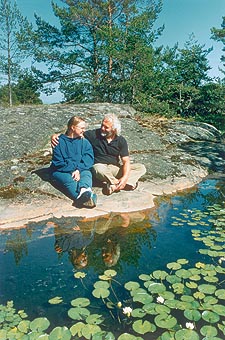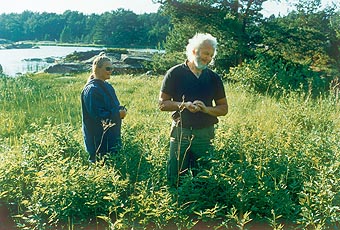 |
|||||||||||||||||
|
|||||||||||||||||
|
In English |
|
 |
Only Nature
Finnish text: Hanna-Leena Nissilä Kaltio 3/04
|
|
Historian of Western thought and senior lecturer Maria Suutala belongs to the small group of Finnish eco-feminists who are always quoted in studies of the field. She says she has learned among the years that the words feminist and eco-feminist can be the worst. - Certain words are just so strongly charged that it's better not to even use them, and instead just discuss the topic, she describes. Some other heavily charged words are animal and animality. Suutala points her finger at Western thinking: it is about humans highlighting they are precisely human and not animal, and about humans always wanting to be better than animals. In the Western thought, animality is bad, and 'animal' is an inferior concept as such. Suutala says this originates historically, on one hand, from the history of creation in the Old Testament, where humans are supposed to be the masters of nature. On the other hand, it comes from the dualist thought of ancient times, the division to body and soul, human and animal. - That ended my childhood with one stroke, and I became an activist at the Finnish nature organisation Luonto-Liitto. In Sotkamo, Luonto-Liitto concentrated in education, and Suutala tried to affect people's opinions even then. In secondary school, she organised a nature club, which didn't find enough support. She got frustrated with the few opportunities organisations could offer after acting as a member of the board in the Kainuu section of the Finnish Association for Nature Conservation as a teenager. However, one thing became clear: she wanted to work for the best of nature. Suutala, who considers herself impractical, didn't study biology even though that was one of the options she considered. History of Western thought is a field where she has been researching the reasons for why we treat nature badly. At first, Suutala studied people's relationship with nature and animals. When she got her results, she got interested in the history of women as well. She noticed that the history of women and nature, as well as the history of women and animals, were connected. Suutala became an eco-feminist. Suutala says publishing eco-feminist literature in Finland is not easy; the limits of spiritual courage are narrow in a small country. Not everyone likes eco-feminism even among the women's movement. According to Kaarina Kailo, feminism that discusses state and equality dominates in Finland, and Finnish feminism has for a long time concentrated on women's equality with men. Eco-feminism, on the other hand, could be portrayed as a feminism of a positive difference, for it takes into account women's difference. Kailo herself represents ecological feminism, which is critical about globalisation, whereas Suutala focuses on nature. However, the starting point in different variations of eco-feminism is the same, that is the thought of an unhierarchical world where everything is part of nature, and where there is no dualist division into nature and culture. Kailo says that the predominating misconception of eco-feminism being essentialist - a thought that sees women naturally closer to nature - causes odd features in the Finnish feminism. - Perhaps Finnish women are scared of being uncritically connected with the mother cult and nature, even though this is not the case, Kailo wonders and highlights that in reality, eco-feminism is about valuing the female body again instead of the myths of church and dirtiness. Suutala says that people are critical or at least careful about eco-feminism because it poses a demand. Eco-feminism, just like Suutala, is not interested in merely liberating women, but it also calls for a change. - I would say that traditional feminism discusses issues with different categories of equality, but eco-feminism goes further. Equality thinking leads to men and women continuing their lives in this life-destroying society somewhat equally, but both still destroying nature. Eco-feminism wants to replace today's society which is patriarchal and destructive of nature, with completely new values, Suutala points out.
Nature means everything to Maria Suutala. It is the basis of life, a healing power and a source of energy. She does not define her image of nature theoretically, but says it is a practical love relationship: - I love nature and nature loves me. Suutala is a Christian who thinks eco-theologically and eco-feministically, which means that to her, God and the Holy Spirit are present everywhere in nature and living creatures. But Suutala wants to define pantheism precisely. She says that former East German philosophy was successful in dividing between material and idealistic pantheism. From the angle of history of Western though, materialistic pantheism where God equals nature is a rare ideology. In the much more popular idealistic pantheism, God is present in nature. Suutala says she likes to learn from Indian philosophy, where it is natural to think that deity is present in nature, and that nature and animals are sacred. -Ecologically thinking, it is totally possible for a Christian to see God in a fox who lives in the islands, Suutala pictures. However, she finds fundamental that regardless of their ideology, people see nature as a living organism that must be protected. - They wanted to put me at some stupid course, and I didn't want to take part in it. I told them I was writing, and the Employment Services decided I employed myself as a writer and a researcher. The state gave me the status of a worker, and from there started the greatest freedom of my life. From then on, I have been working directly for God, and I'm still alive, Suutala says and laughs catchingly. In 1997 came out Swedish Kvinnor och andra djur, and in 1999 Suutala's other German book Zur Geschichte der Naturzerstörung: Frau und Tier in der wissenschaftlichen Revolution. Suutala has been unable to find a publisher to the Finnish script of the book. Kesytetty nainen: Seksuaalisuus ja luontosuhde länsimaisessa ajattelussa [A Woman Tamed: Sexuality and the Relationship with Nature in Western Thought] came out in 2001, and her latest book Kettu luumupuussa (A Fox in a Plum Tree; published by Myllylahti) just this year. The book is comprised of essays and stories and in it, the results of research in the archipelago meet fiction. Suutala's most radical thoughts have clashed with publishers' prejudice and even censorship. She cannot always understand what limits her thoughts have crossed. - Of course I can't say myself what part of this is due to my thinking and what part to the capitalistic system, where the buyer's market rules, she ponders. A section in one of Suutala's books, where she suggests a Holy Communion with animals, was almost taken out. When Suutala demanded including it in the book, it was left in. Also the suggestion to follow the way of North American Indian women and hanging safety pads on trees is something that always runs into censorship. Suutala says hanging a pad on a birch tree at the summer cottage can free one from despising and feeling shame about menstrual blood. 
- If he hadn't gotten to know me, he would have moved to Sahara desert, Suutala laughs. Originally, Ernst Heller was a world-travelling currency dealer for a Swiss bank, having to change a clean dress shirt on many times a day. After he saw how much destruction money causes in the world, he turned into a hippie overnight and began to lead an alternative life. His ideology is that of the late Sri Aurobindon, who represents modern Indian philosophy. In the archipelago, Maria Suutala and Ernst Heller-Suutala have sought to produce themselves as much food as possible, as well as collecting food directly from the nature. The plum trees are bent under the weight of fruit, and money has not been needed. Life in the archipelago has been swaying in the arms of the sea, paddling a kayak to the furthest islet, becoming friends with the elderly of the islands and building a love for the much hated snake. Suutala tells that the hatred for snakes originates mainly from the Fall of Man in the Bible, where snake becomes a hated animal as the symbol of sin and the Satan. Suutala says the snake symbolises evil in the Fall because patriarchal Jewish culture attempted to supercede the matriarchal cultures around them by twisting whatever was holy in these cultures. In matriarchal cultures, snake is the sacred animal of sexuality and the womb. The snake has been a positive animal also in Fenno-Ugric and Germanic cultures, for it has brought happiness and health. - We can also take as ecological sanity the fact that snake belongs to the ecosystem as much as any other animal. Once you learn to see these sides of the snake, it's also easier to love it, Suutala says. Suutala has also gotten to know foxes in the rocky islands. One of them ate from her hand. First, it circled around Suutala to make sure it was not in danger, and as it ate, it always looked her directly in the eyes. Later on, an old man told about his fox friend who was killed. It used to fetch the man apples that had fallen on the ground in the autumn and had once even sat eating in a plum tree. Suutala says her relationship to the people in the archipelago, who are surprisingly ecological living outside the consumption society, has changed with the research. These people have gotten used to saving in everything, even with water, and no haters of seals or white-tailed eagles can be found in the islands. - We just don't need those things, she says simply. In her texts and lectures, Maria Suutala has called for people to rediscover their relationship with the nature. That can be practiced first on the level of thought in order to learn to recognise where all the negative thoughts come from. The history of Western thought and philosophy are great instruments in this work. Slowly, the negative thoughts are replaced with thoughts favourable to life. In practice, the relationship with nature can be best found by going to the nature, for instance by taking a little walk. A symbolic alliance with nature can be formed later, if there is enough courage. - I got married to a tree last summer. I found a lovely old pear tree that was full of fruit, and I chose it. It sounds crazy, but crazy deeds set you free, because they break the boundaries of traditional thinking, Suutala says. - But don't write that in the article, people will get it wrong anyway, she laughs. |
|
